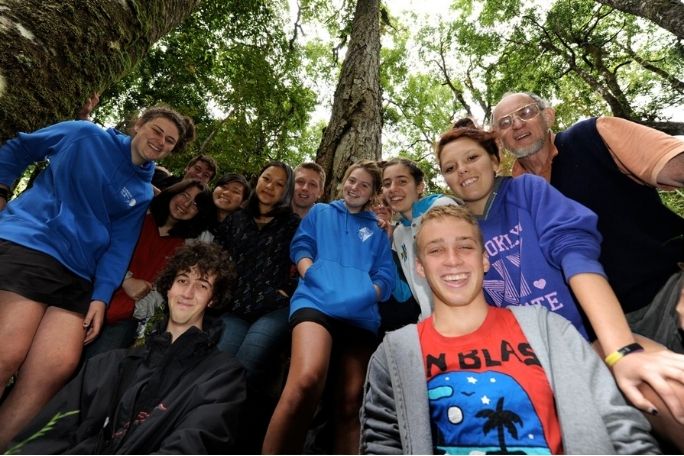Lesson summary
Students work in groups to develop a plan that will actively engage members of the community in the school biodiversity trail they created. Students begin by identifying what key issues relating to their biodiversity trail they are most interested in, and then work in groups to develop a project for action around this theme. They will continue to collaboratively plan their project and execute this plan. Finally, students are asked to reflect upon the success of their project and their role in creating and executing the project.
Learning intentions:
Students will...
- be able to use their learning to engage the local community in taking action for climate change and local biodiversity
- be able to drive the processes of planning and executing a social action project
Success criteria:
Students can...
- use their skills and interests to engage their community in actions for change
- collaborate and communicate in groups
- follow the processes and steps required for planning and executing a social action project
Lesson guides and printables
Lesson details
Curriculum mapping
Australian curriculum content descriptions:
NOTE – This unit has been designed to be taught in either Geography or Science. To further enhance the learnings from this unit for students, consider teaching this as a cross-curricular unit of work.
Year 7 Geography:
- Reflect on their learning to propose individual and collective action in response to a contemporary geographical challenge, taking account of environmental, economic and social considerations, and predict the expected outcomes of their proposal (ACHGS054)
Year 8 Geography:
- Reflect on their learning to propose individual and collective action in response to a contemporary geographical challenge, taking account of environmental, economic and social considerations, and predict the expected outcomes of their proposal (ACHGS062)
Year 7 Science:
- Science knowledge can develop through collaboration across the disciplines of science and the contributions of people from a range of cultures (ACSHE223)
- Communicate ideas, findings and evidence based solutions to problems using scientific language, and representations, using digital technologies as appropriate (ACSIS133)
Year 8 Science:
- Science knowledge can develop through collaboration across the disciplines of science and the contributions of people from a range of cultures (ACSHE226)
- Communicate ideas, findings and evidence based solutions to problems using scientific language, and representations, using digital technologies as appropriate (ACSIS148)
Syllabus outcomes: SC4-9WS, SC4-17CW.
General capabilities: Critical and Creative Thinking.
Cross-curriculum priority: Sustainability OI.6, OI.7, OI.8, OI.9.
Relevant parts of Year 7 Geography achievement standards: Students propose action in response to a geographical challenge, taking account of environmental, economic and social factors, and describe the expected effects of their proposal.
Relevant parts of Year 8 Geography achievement standards: Students propose action in response to a geographical challenge, taking account of environmental, economic and social factors, and predict the outcomes of their proposal.
Relevant parts of Year 7 Science achievement standards: Students describe situations where scientific knowledge from different science disciplines and diverse cultures has been used to solve a real-world problem. Students will communicate their ideas, methods and findings using scientific language and appropriate representations.
Relevant parts of Year 8 Science achievement standards: Students describe situations in which scientists collaborated to generate solutions to contemporary problems. Students use appropriate language and representations to communicate science ideas and findings in a range of text types.
Unit of work: ClimateWatch: Citizen Science – Geography and Science – Years 7 & 8.
Time required: 165+ mins (plus time for students to complete action projects).
Level of teacher scaffolding: Medium – oversee discussion, lead students in activities.
Resources required
- Student Worksheet – one copy per student
- One printed copy of Project Planning Tool for each group
- Project Checklist
- Butcher’s paper and marker pens
- Online stopwatch
Skills
This lesson is designed to build students’ competencies in the following skills:
- Collaboration
- Community engagement
- Communication
- Critical thinking
- Problem solving
Additional info
The lessons in this unit have been developed in partnership with Earthwatch. Earthwatch developed the ClimateWatch program with the Bureau of Meteorology and The University of Melbourne to understand how changes in temperature and rainfall are affecting the seasonal behaviour of Australia’s plants and animals.


Welcome back!
Don't have an account yet?
Log in with:
By signing up to Cool.org you consent and agree to Cool's privacy policy to
store, manage and process your personal information. To read more, please see
our privacy policy here(Opens in new tab).
Create your free Cool.org account.
Many of our resources are free, with an option to upgrade to Cool+ for premium content.
Already have an account?
Sign up with:
By signing up to Cool.org you consent and agree to Cool's privacy policy to
store, manage and process your personal information. To read more, please see
our privacy policy here(Opens in new tab).